Fleurs du Mal Magazine


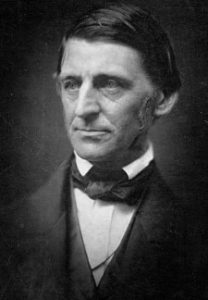
The Apology
Think me not unkind and rude,
That I walk alone in grove and glen;
I go to the god of the wood
To fetch his word to men.
Tax not my sloth that I
Fold my arms beside the brook;
Each cloud that floated in the sky
Writes a letter in my book.
Chide me not, laborious band,
For the idle flowers I brought;
Every aster in my hand
Goes home loaded with a thought.
There was never mystery,
But ’tis figured in the flowers,
Was never secret history,
But birds tell it in the bowers.
One harvest from thy field
Homeward brought the oxen strong;
A second crop thine acres yield,
Which I gather in a song.
Ralph Waldo Emerson
(1803 – 1882)
The Apology
•fleursdumal.nl magazine
More in: Archive E-F, Archive E-F, Emerson, Ralph Waldo, MONTAIGNE

Gij deed van alle mensen
Gij deed van alle mensen mij
De zwaarste pijn,
Van alle mensen zult ge mij
De liefste zijn.
J.H. Leopold
(1865-1925)
Gij deed van alle mensen
Vroege gedichten
• fleursdumal.nl magazine
More in: Archive K-L, Archive K-L, Leopold, J.H.
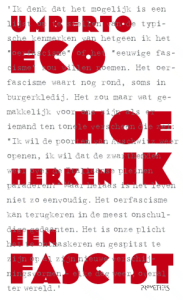 Umberto Eco
Umberto Eco
was een Europeaan
in hart en nieren.
De oorlog in Oekraïne en het steeds verder naar een totalitaire staat afglijdende Rusland zou hij met pijn in het hart hebben aanschouwd.
Maar hij zou waarschijnlijk ook op alle mogelijke manieren van zich hebben laten horen en zich volop hebben ingezet voor vrede.
In Hoe herken ik een fascist, een selectie van drie belangrijke essays, weerklinkt Eco’s immer kritische stem.
Het is een stem waarnaar we moeten luisteren, want sluipend fascisme (‘Het eeuwige fascisme’) en zelfopgelegde censuur (‘Censuur en stilte’) vormen een steeds grotere bedreiging voor de Europese vrede.
Zijn oproep om tot nieuwe Europese afspraken te komen (‘Een nieuw verdrag van Nijmegen’) is dan ook bijna profetisch te noemen.
Umberto Eco (1932-2016) was een van de grootste en succesvolste schrijvers van Europa. Hij werd beroemd met zijn historische roman De naam van de roos, waarna romans volgden als De slinger van Foucault, Het eiland van de vorige dag, De begraafplaats van Praag en Het nulnummer. Ook geldt hij als een van de invloedrijkste essayisten van zijn tijd.
Umberto Eco
Hoe herken ik een fascist
Taal: nl
Paperback
2024
80 pagina’s
Uitgeverij Prometheus
EAN 9789044656794
12,50 EURO
•fleursdumal.nl magazine
More in: - Book News, - Bookstores, Archive E-F, Fascism, Umberto Eco
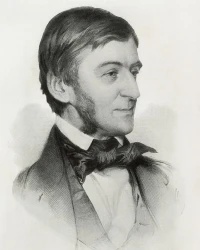
Ode To Beauty
Who gave thee, O Beauty!
The keys of this breast,
Too credulous lover
Of blest and unblest?
Say when in lapsed ages
Thee knew I of old;
Or what was the service
For which I was sold?
When first my eyes saw thee,
I found me thy thrall,
By magical drawings,
Sweet tyrant of all!
I drank at thy fountain
False waters of thirst;
Thou intimate stranger,
Thou latest and first!
Thy dangerous glances
Make women of men;
New-born we are melting
Into nature again.
Lavish, lavish promiser,
Nigh persuading gods to err,
Guest of million painted forms
Which in turn thy glory warms,
The frailest leaf, the mossy bark,
The acorn’s cup, the raindrop’s arc,
The swinging spider’s silver line,
The ruby of the drop of wine,
The shining pebble of the pond,
Thou inscribest with a bond
In thy momentary play
Would bankrupt Nature to repay.
Ah! what avails it
To hide or to shun
Whom the Infinite One
Hath granted his throne?
The heaven high over
Is the deep’s lover,
The sun and sea
Informed by thee,
Before me run,
And draw me on,
Yet fly me still,
As Fate refuses
To me the heart Fate for me chooses,
Is it that my opulent soul
Was mingled from the generous whole,
Sea valleys and the deep of skies
Furnished several supplies,
And the sands whereof I’m made
Draw me to them self-betrayed?
I turn the proud portfolios
Which hold the grand designs
Of Salvator, of Guercino,
And Piranesi’s lines.
I hear the lofty Pæans
Of the masters of the shell,
Who heard the starry music,
And recount the numbers well:
Olympian bards who sung
Divine Ideas below,
Which always find us young,
And always keep us so.
Oft in streets or humblest places
I detect far wandered graces,
Which from Eden wide astray
In lowly homes have lost their way.
Thee gliding through the sea of form,
Like the lightning through the storm,
Somewhat not to be possessed,
Somewhat not to be caressed,
No feet so fleet could ever find,
No perfect form could ever bind.
Thou eternal fugitive
Hovering over all that live,
Quick and skilful to inspire
Sweet extravagant desire,
Starry space and lily bell
Filling with thy roseate smell,
Wilt not give the lips to taste
Of the nectar which thou hast.
All that’s good and great with thee
Stands in deep conspiracy.
Thou hast bribed the dark and lonely
To report thy features only,
And the cold and purple morning
Itself with thoughts of thee adorning,
The leafy dell, the city mart,
Equal trophies of thine art,
E’en the flowing azure air
Thou hast touched for my despair,
And if I languish into dreams,
Again I meet the ardent beams.
Queen of things! I dare not die
In Being’s deeps past ear and eye,
Lest there I find the same deceiver,
And be the sport of Fate forever.
Dread power, but dear! if God thou be,
Unmake me quite, or give thyself to me.
Ralph Waldo Emerson
(1803 – 1882)
Ode To Beauty
•fleursdumal.nl magazine
More in: Archive E-F, Archive E-F, Emerson, Ralph Waldo

Lie-a-bed
My darling lies down
in her soft white bed,
And she laughs at me.
Her laughter has flushed
her pale cheeks with red.
Her eyes dance with glee.
My darling lies close
in her warm white bed,
And she will not rise.
I will shower kisses
down on her sleepyhead
Till she close her eyes.
Gioja’s no happier fresh
from the South.
But my kisses free
Will straiten the curves of
this teasing mouth,
If it laughs at me.
Lesbia Harford
(1891-1927)
Lie-a-bed
• fleursdumal.nl magazine
More in: Archive G-H, Archive G-H, Feminism, Harford, Lesbia, Workers of the World
Under a Future Sky is a gathering of generations, a performance with ghosts anchored in Brynn Saito’s journey with her father to the desert prison where, over 80 years ago, her grandparents met and made a life.
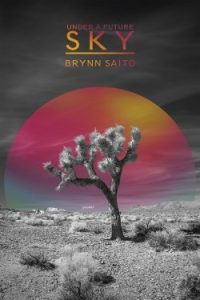 Born of a personal ache, an unquenchable desire to animate the shadow archive, Saito’s journey unfolds in lyric correspondences and epistolary poems that sing with rage, confusion, and, ultimately, love. In these works, descendants of wartime incarceration exchange dreams, mothers become water goddesses, and a modern daughter haunts future ruins. To enter this book is to enter the slipstream of nonlinear time, where mystical inclinations, yellow cedars, and sisterhood make a balm for trauma’s scars. Altogether, the work enacts a dialogue between the past and the present; the radical ancestor and the future child; and the desert prison and the family garden, where Saito’s father diligently gathers stones.
Born of a personal ache, an unquenchable desire to animate the shadow archive, Saito’s journey unfolds in lyric correspondences and epistolary poems that sing with rage, confusion, and, ultimately, love. In these works, descendants of wartime incarceration exchange dreams, mothers become water goddesses, and a modern daughter haunts future ruins. To enter this book is to enter the slipstream of nonlinear time, where mystical inclinations, yellow cedars, and sisterhood make a balm for trauma’s scars. Altogether, the work enacts a dialogue between the past and the present; the radical ancestor and the future child; and the desert prison and the family garden, where Saito’s father diligently gathers stones.
Brynn Saito is the author of Power Made Us Swoon (2016) and The Palace of Contemplating Departure (2013), winner of the Benjamin Saltman Poetry Award from Red Hen Press and a finalist for the Northern California Book Award. She has received grant support from Densho, Hedgebrook, and the Santa Fe Arts Institute. Her poems have appeared in the New York Times and American Review among other journals and anthologies. She was a finalist for the Paterson Poetry Prize and the Milt Kessler Poetry Book Award. Brynn lives in Fresno, CA, where she is an Assistant Professor at California State University, Fresno and co-director of Yonsei Memory Project.
Brynn teaches in the MFA program at California State University, Fresno. She’s co-editing with Brandon Shimoda an anthology of poetry written by descendants of the Japanese American / Nikkei incarceration, forthcoming in 2025 from Haymarket Books.
Under a Future Sky
by Brynn Saito
112 pages
August 15, 2023
ISBN-13 978-1636281070
Publisher: Red Hen Press
Hardcover
€20,99
•fleursdumal.nl magazine
More in: #Editors Choice Archiv, *War Poetry Archive, - Book News, - Bookstores, Archive S-T, Archive S-T, Racism
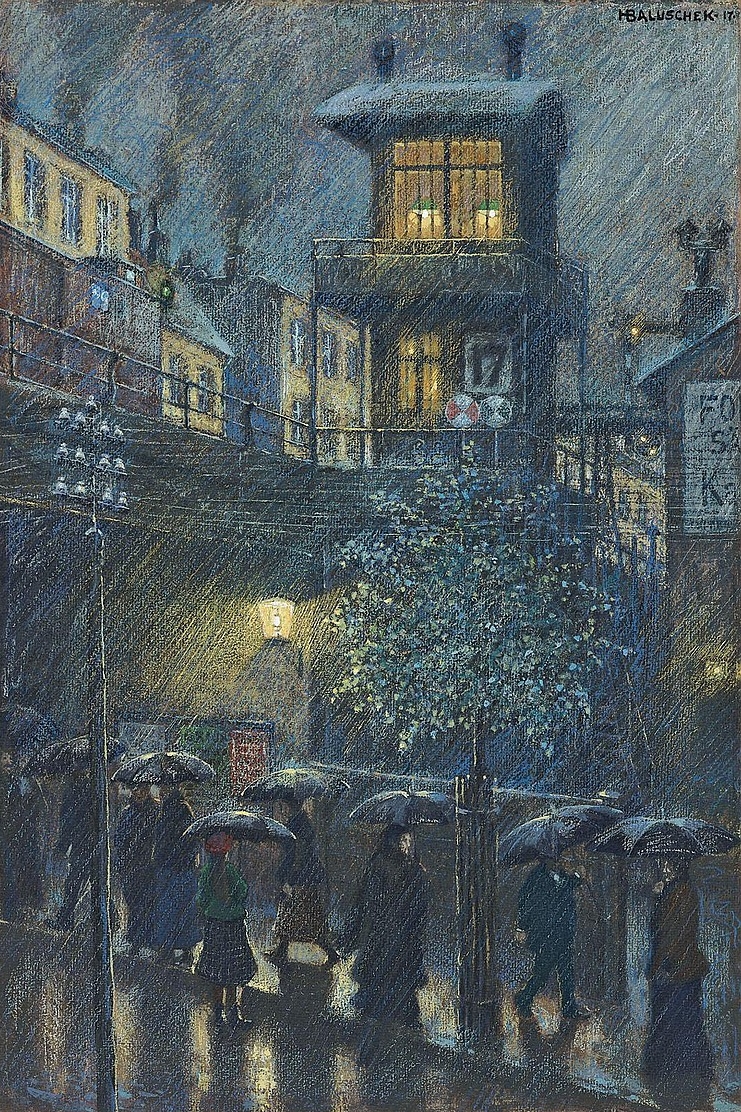
Regen
Bij het gelijknamige schilderij uit 1917 van Hans Baluschek
Droomloze schaduwen doen mensen op ieder
twee mensen lijken. Ze menen dat ze pas bestaan
als ze praten maar onzichtbaar als hoorspelen is
hun taal, een cadans in balans met het zwijgen.
Ze willen vreemde woorden spreken die lichtjes
opstijgen, en daar met de vinger naar wijzen.
Bert Bevers
Regen
•fleursdumal.nl magazine
More in: Archive A-B, Archive A-B, Bevers, Bert, FDM in Berlin

The Snow-Storm
Announced by all the trumpets of the sky,
Arrives the snow, and, driving o’er the fields,
Seems nowhere to alight: the whited air
Hides hills and woods, the river, and the heaven,
And veils the farm-house at the garden’s end.
The sled and traveller stopped, the courier’s feet
Delayed, all friends shut out, the housemates sit
Around the radiant fireplace, enclosed
In a tumultuous privacy of storm.
Come see the north wind’s masonry.
Out of an unseen quarry evermore
Furnished with tile, the fierce artificer
Curves his white bastions with projected roof
Round every windward stake, or tree, or door.
Speeding, the myriad-handed, his wild work
So fanciful, so savage, nought cares he
For number or proportion. Mockingly,
On coop or kennel he hangs Parian wreaths;
A swan-like form invests the hidden thorn;
Fills up the farmer’s lane from wall to wall,
Maugre the farmer’s sighs; and, at the gate,
A tapering turret overtops the work.
And when his hours are numbered, and the world
Is all his own, retiring, as he were not,
Leaves, when the sun appears, astonished Art
To mimic in slow structures, stone by stone,
Built in an age, the mad wind’s night-work,
The frolic architecture of the snow.
Ralph Waldo Emerson
(1803 – 1882)
The Snow-Storm
•fleursdumal.nl magazine
More in: 4SEASONS#Winter, Archive E-F, Archive E-F, Emerson, Ralph Waldo

Song for the New Year
Old Time has turned another page
Of eternity and truth;
He reads with a warning voice to age,
And whispers a lesson to youth.
A year has fled o’er heart and head
Since last the yule log burnt;
And we have a task to closely ask,
What the bosom and brain have learnt?
Oh! let us hope that our sands have run
With wisdom’s precious grains;
Oh! may we find that our hands have done
Some work of glorious pains.
Then a welcome and cheer to the merry new year,
While the holly gleams above us;
With a pardon for the foes who hate,
And a prayer for those who love us.
We may have seen some loved ones pass
To the land of hallow’d rest;
We may miss the glow of an honest brow
And the warmth of a friendly breast:
But if we nursed them while on earth,
With hearts all true and kind,
Will their spirits blame the sinless mirth
Of those true hearts left behind?
No, no! it were not well or wise
To mourn with endless pain;
There’s a better world beyond the skies,
Where the good shall meet again.
Then a welcome and cheer to the merry new year,
While the holly gleams above us;
With a pardon for the foes who hate,
And a prayer for those who love us.
Have our days rolled on serenely free
From sorrow’s dim alloy?
Do we still possess the gifts that bless
And fill our souls with joy?
Are the creatures dear still clinging near?
Do we hear loved voices come?
Do we gaze on eyes whose glances shed
A halo round our home?
Oh, if we do, let thanks be pour’d
To Him who hath spared and given,
And forget not o’er the festive board
The mercies held from heaven.
Then a welcome and cheer to the merry new year,
While the holly gleams above us;
With a pardon for the foes who hate,
And a prayer for those who love us.
Eliza Cook
(1818 – 1889)
Song for the New Year
•fleursdumal.nl magazine
January 01, 2025
More in: # Classic Poetry Archive, Archive C-D, Archive C-D
Thank you for reading Fleurs du Mal - magazine for art & literature